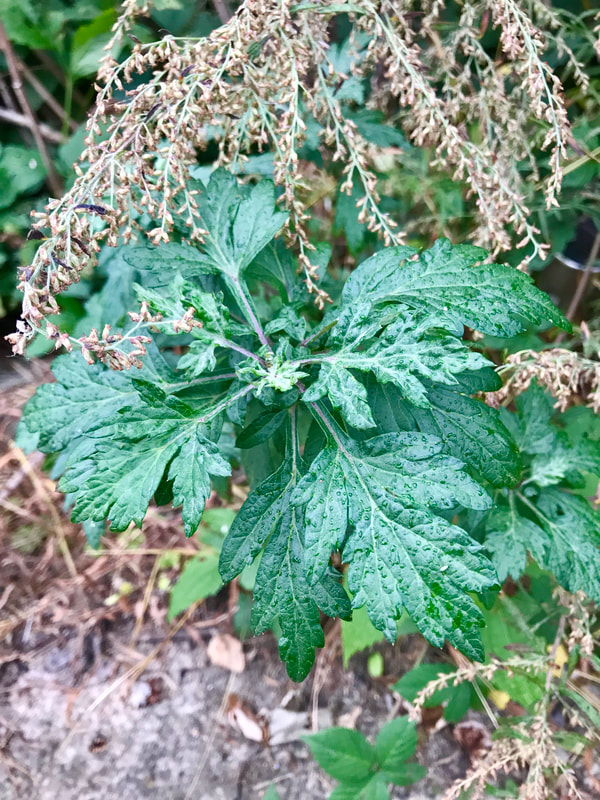|
For Calming the Nerves, Promoting Menstruation, and Relieving Itching “The mugwort plant has been traditionally used for everything from digestive disorders to beer-making, insect repellent, and more. Mugwort (Artemisia vulgaris L.) is a perennial plant in the Asteraceae family. The plant is native to Northern Europe, and Asia; it can also be found in many parts of North America. The mugwort plant grows to 4 feet in height, but occasionally reaches heights of up to 6 feet. Its angular reddish-brown stems have bitter-tasting leaves that have a sage-like aroma. The plant blooms with yellow or dark orange flowers in the summer. The aerial parts of the mugwort plant are used as an essential oil. The plant is also burned in moxibustion practices. In addition to its medicinal use, mugwort has been used for smudging, protection, and inducing vivid dreams (when placed underneath a person’s pillow). Historically, mugwort was used by the Romans, who are said to have planted it by roadsides, so that marching soldiers could put the plant in their shoes. This was done to relieve aching feet. St. John the Baptist was said to have worn a girdle of mugwort. Health Benefits Mugwort has been ascribed many health-promoting and other beneficial properties.1 These include:
Common Uses
What Is Moxibustion? As part of traditional Chinese medicine (TCM), mugwort has been used in the practice of moxibustion for thousands of years. Moxibustion involves rolling mugwort into sticks or cones, igniting it, then waving it over the area that is to be treated. This serves to stimulate the acupuncture point with heat and the herb's chemical compounds. Although this procedure may sound primitive, there is clinical research evidence that backs the effectiveness of moxibustion and lends some credibility to the practice of moxibustion. How It Works The parts of the mugwort plant that grow aboveground are used to make essential oil, which is composed of several therapeutic chemicals (including camphor, pinene, and cineole). This chemical composition has diverse health-promoting properties including the plant’s antioxidant, antibacterial, and antifungal effects. Another chemical that has been extracted from mugwort is called artemisinin. It is thought to have antitumor activity. In addition, the chemicals in mugwort are thought to stimulate the uterus to contract, promoting menstrual flow. These chemicals are thought to lend themselves to the labor process in childbirth. This may result in a reduction in the dose of oxytocin to stimulate labor contractions. In ancient cultures, mugwort was smoked to promote vivid dreams. This is because mugwort is said to produce mild psychotropic effects during wakefulness. A psychotropic effect can be induced by a substance that impacts the mental state of a person. A lotion made of mugwort is sometimes applied to the skin for alleviating itching, caused by scars or burns. Research has shown that a lotion made of mugwort and menthol, applied to the skin, relieved itching in burn victims. Mugwort is considered a mild psychoactive herb (a substance that promotes effects such as sedation and euphoria). Some people take it for its hallucinogenic effects. In ancient cultures, mugwort was smoked to promote vivid dreams. This is because mugwort is said to produce mild psychotropic effects during wakefulness. A psychotropic effect can be induced by a substance that impacts the mental state of a person. A lotion made of mugwort is sometimes applied to the skin for alleviating itching, caused by scars or burns. Research has shown that a lotion made of mugwort and menthol, applied to the skin, relieved itching in burn victims. Is mugwort the same as wormwood? There is some disagreement about the difference between mugwort and wormwood. Herbs have many different common names, which can cause confusion. By looking at the scientific name, it’s easy to identify when there are differences in the plants. The scientific name for wormwood is Artemisia absinthium. Mugwort’s scientific name, however, is Artemisia vulgaris. Although the two plants are closely related, there is a slight difference. Mugwort refers to all 200 aromatic plants found in the Artemisia genus; wormwood is just one of them. Wormwood (Artemisia absinthium) is the only variation of Artemisia that can be used to distill authentic absinthe. It is also commonly used to make vermouth. Possible Side Effects Mugwort is likely unsafe for people who are pregnant or breastfeeding. “ Source: Excerpts from article written By Sherry Christiansen Medically reviewed by Arno Kroner, DAOM, LAc Full article published in Verywellhealth.com Black Tourmaline Gemstone Soap with Frankincense & Vetiver
$9.00
Glycerin Infused with Activated Charcoal & Iron Wild Harvested Mugwort Hydrosol & Essential Oil Frankincense, Vetiver, Patchouli, Black Pepper, Eucalyptus DIRECTIONS: Work into lather with warm water and wash skin. Rinse thoroughly. Suitable for sensitive skin. External use only. INGREDIENTS: Saponified Oils of Coconut, Castor, Hemp, Glycerin, Butterfly Peaflower, Activated Charcoal (Coconut) and Iron Oxide, Glycerin, Essential Oil Blend, Mica, Calendula & Turmeric. Contains one Black Tourmaline Gemstone. Approx. 5 oz Bar Vegan. Unisex. Organic & Non-GMO Ingredients. DreamEscape Terrazzo Bastille Soap
$10.00
Sold Out. Next batch ready on 5.25.25 A mystical blend of Wild Organic Mugwort, Sweet Chamomile, Frankincense & Lavender. Directions: Wash with warm water and rinse thoroughly. Suitable for sensitive skin types. Unisex. Ingredients: Saponified Oils of Olive, Coconut, Sunflower, Castor & Avocado, Lavender, Calendula, Kaolin Clay, Glycerin, Natural Colorants including Madder Root, Charcoal, Turmeric and Indigo, Plant oils including Sweet and Blood Orange, Frankincense & Chamomile, Orange Blossom Water, Mica and topped with assorted Gemstones. Approx. 4 oz Sweet Dreams Mist
$18.00
A mystical blend of Wild Organic Mugwort, Sweet Chamomile, Frankincense & Lavender. Instructions: Spray around self, pillows and bedsheets and set your intentions for a night of positive dream experiences. Approx. 3.75 oz Use caution if pregnant or trying to conceive. Poppy Lane Body Crème
$18.00
An Intoxicating Opium Blend for Silky Soft Skin Olive, Hemp, Flax Distilled Mugwort & Poppy Extract Rose Water, Vitamin E & C Poppy Lane Body Soap
$7.00
An Intoxicating Opium Blend for Silky Soft Skin
5.5oz Approx. Clove with Mugwort Soap
$7.00
Organic Mugwort Clove, Sweet Orange & Cinnamon Glycerin, Olive & Vitamin E Non-Drying, Unisex, Vegan DIRECTIONS: Work into lather with warm water and wash skin. Rinse thoroughly. Suitable for sensitive skin. Face, hand & body. External use only. Ingredients: Saponified oils of Coconut, Olive & Hemp, Glycerin, Mugwort, Clove, Cocoa, Sandalwood, Sweet Orange, Vitamin E, Turmeric Root. 4.5 oz Approx. Lavender and Cedar Bath Bomb
$6.00 - $20.00
Ingredients: Sodium Bicarbonate, Citric Acid, Frumentum amulum, Kaolin Clay, Rose Clay, Helichrysum, Coconut Oil, Vitamin E, Calendula, Rosehip, Essential Oil Blend, Forget Me Nots & Mica. Each Bomb = Approx. 6oz *This product contains healing oils, use caution in the tub and wipe out tub after bath to prevent slips. Pink Moon Water
$20.00
UPLIFTING. GROUNDING. DREAM ASSISTING. Pink Moon Water Aromatherapy Mist A mystical blend of 2024 Pink Moon Water charged with gemstones of Moonstone, Amethyst, Quartz, Citrine, Serpentine & Black Tourmaline. Ingredients: Distilled Pink Moon Water infused with Wild Mugwort Hydrosol and oils of Pine, Basil, Blood Orange & Wormwood. Each bottle contains Carnelian & Citrine Gemstones. Directions: Spray around self and living area as needed. External Use Only. Use caution if pregnant or trying to conceive. Approx. 3.75 oz Vegan. Unisex. Cruelty Free. Plant Based. Organic.
0 Comments
|
 Thank you for your support and interest! Valoree Thank you for your support and interest! Valoree
Archives
March 2023
Categories |

 RSS Feed
RSS Feed